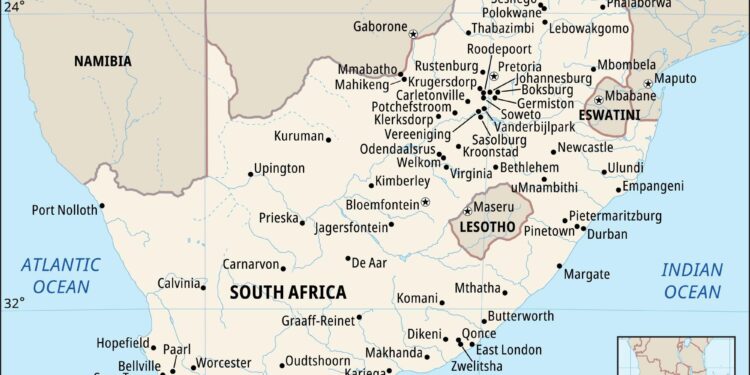In a significant shift in fiscal policy, South Africa has decided to abandon its proposed hike in value-added tax (VAT) following widespread backlash from various sectors of society. The intended increase, which aimed to address escalating budgetary pressures, faced fierce resistance from consumer advocacy groups, business leaders, and political parties, all warning of its potential impact on the already strained living conditions of many South Africans. This decision reflects the government’s responsiveness to public sentiment and economic realities, as it seeks to strike a balance between revenue generation and socio-economic stability. As South Africa navigates its complex financial landscape, this development raises questions about future tax strategies and the government’s commitment to addressing the needs of its citizens.
South Africa Reverses VAT Hike Plans Amid Public Outcry and Economic Concerns
The South African government has decided to abandon its plans to increase the Value Added Tax (VAT) amidst significant public opposition and rising economic concerns. This move comes after widespread protests and feedback from civil society organizations, which argued that the proposed hike would disproportionately affect low-income households and exacerbate the existing inequalities in the country. Critics voiced their fears that increasing the VAT could lead to higher prices for essential goods, further straining the budgets of already struggling families.
In response to the backlash, officials emphasized the urgent need to find alternative strategies for generating revenue without placing an additional burden on the populace. Discussions are now focused on other fiscal measures that encourage economic growth while still addressing the urgent financial demands of the state. Possible alternatives include:
- Tax Reforms: Revamping existing tax structures to improve collection efficiency.
- Enhancing Compliance: Strengthening enforcement measures to reduce tax evasion.
- Reducing Expenditure: Conducting a thorough review of government spending to identify potential savings.
Impact of the VAT Decision on Low-Income Families and Overall Economic Stability
The recent decision to scrap the planned VAT hike in South Africa has significant implications for low-income families who are already grappling with the high cost of living. An increase in VAT would have added further strain on household budgets, making essential goods and services even less affordable. With inflation rates climbing, the abandonment of the tax hike is seen as a reprieve for vulnerable communities, providing some stability in financial planning. Analysts suggest that this decision could result in a cushion for families, enabling them to allocate their limited resources towards crucial expenses such as food, healthcare, and education.
Moreover, the overall economic stability of the nation stands to benefit from this pivot. By avoiding the VAT increase, the government can focus on alternative strategies to boost revenue and promote sustainable growth. Experts highlight several potential avenues to explore, including:
- Enhancing tax compliance: Strengthening enforcement measures to ensure that existing tax laws are followed can lead to increased government revenue without additional burdens on the general populace.
- Diversifying the tax base: Exploring new sectors for taxation could reduce reliance on consumption taxes, which disproportionately affect the lower-income bracket.
- Expanding social safety nets: Investing in social programs to support low-income families would address immediate needs while fostering long-term economic resilience.
In light of the VAT controversy, the government must heed the concerns of the public while balancing the need for fiscal responsibility. Moving forward, economic analysts predict that a careful reevaluation of tax policies may lead to a more equitable system that safeguards both the welfare of families and the health of the economy.
Policy Recommendations for Sustainable Fiscal Measures Without Burdening Citizens
As South Africa navigates its fiscal landscape, it is essential to explore sustainable measures that can support government revenue without placing additional burdens on citizens. Experts suggest a multi-faceted approach that includes:
- Broadening the Tax Base: Consideration of including previously untapped sectors in the tax regime to ensure a more equitable distribution of tax responsibilities.
- Incentivizing Compliance: Developing incentives for timely tax compliance could reinforce the existing system while minimizing the need for additional tax hikes.
- Leveraging Technology: Implementing technology-driven solutions for tax collection and management can streamline processes and increase efficiency in revenue generation.
Furthermore, enhancing government transparency and accountability can help restore public trust and support for fiscal policies. Measures to consider include:
- Public Consultation Platforms: Establishing forums for citizens to voice concerns and provide input on fiscal measures can promote more inclusive decision-making.
- Performance Audits: Regular audits of government expenditures aimed at identifying waste and inefficiency can ensure that taxpayer money is utilized effectively.
- Public Awareness Campaigns: Educating citizens about the importance of fiscal policies and their direct impacts can foster a more cooperative environment.
Concluding Remarks
In conclusion, the South African government’s decision to abandon the proposed hike in value-added tax (VAT) reflects the significant public and political pushback against rising costs of living. This move not only underscores the ongoing challenges facing the nation’s economy but also highlights the importance of public sentiment in shaping fiscal policy. As the government seeks alternative measures to stabilize its finances, the focus will likely turn to more sustainable solutions that address the needs of all citizens. Stakeholders will be closely watching how these developments unfold in the coming months, as the implications for economic growth and social welfare remain at the forefront of national discussions.














